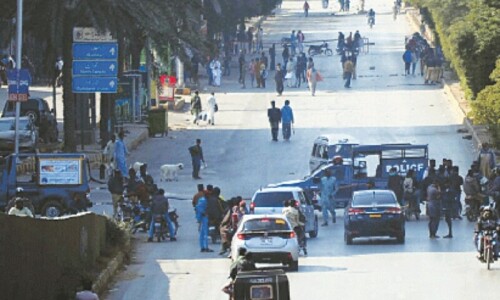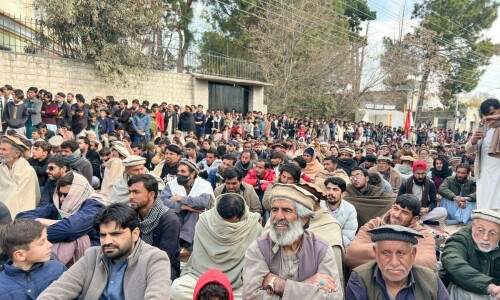
KARACHI: The four-day 17th International Urdu Conference, hosted by the Arts Council of Pakistan, began at the YMCA ground on Thursday, drawing a large number of people, including cultural figures, scholars, and artists.
The evening began with a show-reel highlighting the council’s achievements. During his address, the council’s President Ahmed Shah talked about the goals that the council has accomplished over the years, starting with the times when the political situation of the city was volatile. He told the attendees that 64 sessions will be held during the 17th edition under the theme ‘Jashn-i-Karachi’ (celebrating Karachi).
Senior journalist Ghazi Salahuddin delivered the keynote address. He said Karachi is one of the world’s biggest cities, but it is peculiar and unique in many ways. “I’m calling it unique because after the partition of the subcontinent, demographically no other city has expanded the way Karachi has. No other city has changed like it. Therefore, understanding this city requires attention.”
In order to explain that, he went down memory lane to narrate his own journey vis-à-vis Karachi. He mentioned March 1948 when his family came to Karachi. He was nine or ten years of age. The family reached a small flat in Bolton Market owned by an acquaintance of his [Salahuddin’s] father. They stayed there for a while, then shifted to a quarter in Jahangir Road and then made a house in Khudadad Colony. “Karachi and I kept growing, and today I’m standing here.”
The four-day gala will feature over 60 events
Mr Salahuddin said he could call himself as the storyteller of Karachi. He became a journalist 60 years ago and started working for Hurriyat for which he wrote a column ‘Karachinama’ for two years. “The most significant part of my career was in the 1980s when I wrote a weekly column ‘Karachi Diary’ for Dawn. It was an important part of Pakistan’s history when Gen Ziaul Haq ruled the country. But the world knows about Karachi’s toughness. Perhaps these experiences have enabled Karachi to learn how to be alive. When I wrote ‘Karachi Diary’, I once called Karachi the ‘city without love’. At the time I felt that there was a lack of the sense of belonging here. There’s not a big number of people who can join the struggle for making Karachi a living, breathing city.”
He said Karachi is now moving towards a plural society. “The other thing that needs to be understood is that countries and societies don’t just progress economically… the fact is that that economic progress is possible only when society’s intellectual and creative abilities are realised. It is the duty of art and literature to make a society to dream collectively. The Arts Council is doing that. A city doesn’t just need physical infrastructure; it also needs intellectual infrastructure.”
Mr Salahuddin said it can be said that the theme ‘Jashn-i-Karachi’ is part of the process of empowering the youth. “Big cities have a special energy. Karachi has the same. Ambitious young people get attracted to big cities. The Arts Council has tapped into the city’s creative potential.”
He said relationships are complex so we shouldn’t ask what the city is giving us, but must tell what we’re giving to the city. “Just being a citizen is a designation.”
Humorist and satirist Anwar Maqsood said he’s asked not to speak about Islamabad, Lahore, Peshawar, Quetta and katchey ka ilaqa… he would only speak about Karachi. “When Pakistan came into being, the country’s population was 77,256,000 (seven crores 72 lacs and 56,000). Today it’s 24 crores. Three crore people live in Karachi. When census is undertaken in the city, they only count the men. It’s a big city. [But] it will improve.”
The Chief Minister of Sindh, Murad Ali Shah, was the chief guest on the inaugural day of the conference. He said it’s a matter of pride for all that Karachi is hosting the 17th Urdu Conference. The Arts Council has a central role in it, because of which we get to celebrate our national languages and present them in front of the world with pride. “At this juncture, I congratulate the council for successfully organising the World Culture Festival last month in which artists representing 44 countries took part. It was a huge event which shut the mouths of many [who spoke bad of].”
The chief minister said that Urdu was the language of the common man and still is. To date, it works as a bridge among different units of the country. “The city has the central importance in terms of the languages spoken in the country.”
CM Shah said he’s traveled all over the globe and doesn’t think that there’s a better city than Karachi in the world.
Lifetime achievement awards were also given during the opening ceremony to the following distinguished individuals: Prof Dr Pirzada Qasim Raza Siddiqui, Abdul Hamid Akhund, Ramazan Baloch, Sarwat Mohiuddin, Dr Abasin Yousufzai and Riffat Abbas.
After the formal inauguration of the conference, television anchors Waseem Badami and Tabish Hashmi were invited on stage. The two had a light-hearted conversation.
Published in Dawn, December 6th, 2024














































Dear visitor, the comments section is undergoing an overhaul and will return soon.